Sri Lanka
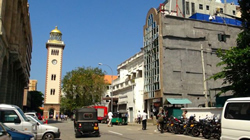
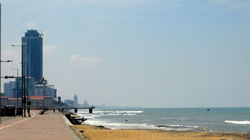
1. Activities (2014- )
| Month/ Year | Places (Prefecture, etc.) | Activities |
| 2024/11/26 | Tsukuba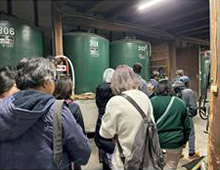 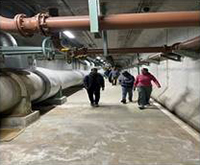 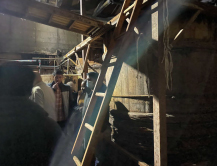 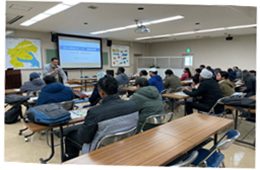 |
The participants visited a water treatment plant, a sake brewery, and a soy sauce brewery in the Kasumigaura Lake region to explore the potential of biotechnology in advancing a sustainable society. During the internship, they learned how biological processes are applied and managed. They also gained insight into agrotourism by studying the rich history of sake and soy sauce fermentation, discovering how these traditions are deeply intertwined with Japanese culture and Have contributed to the local community. |
| 2024/08/10-08/14 | Shanghai (China)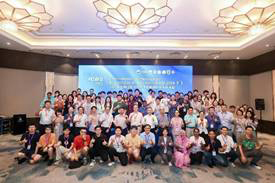 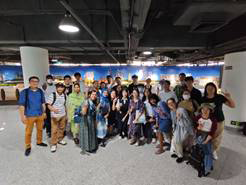 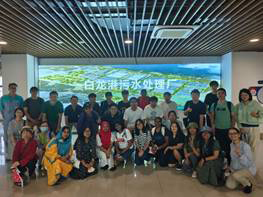 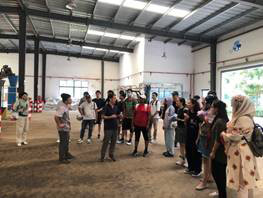 |
From August 10 to 11, the students attended the International Conference on Bioprocess and Sustainability 2024 (ICBS2024) organized by Shanghai Academy of Environmental Sciences, Tongji University, Shanghai University, Tsinghua University, Nankai University, Hainan University and University of Tsukuba. In this conference the students had a good communication with the 18 invited professors and about 300 participants on the advancements of biological processes and their contributions to sustainable development goals (SDGs). In the following three days, the students firstly visited Shanghai Mengqing Theme Park where they acquired the history of water pollution, sewage collection, and management in Shanghai. During the visit to Shanghai Bailonggang Wastewater Treatment Plant (WWTP), the largest WWTP in Asia, the students learned how this largest WWTP treats about one-third of the sewage and sludge produced in Shanghai and gradually improves its sustainability. In Shanghai Qingpu Agricultural Park, they deeply understood how the local farmers environmentally friendly manage their farmland including irrigation system and agricultural wastes with improved crop productivity and quality in the context of SDGs. |
| 2024/07/30-08/01 | Tohoku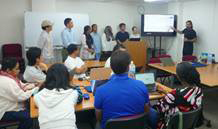 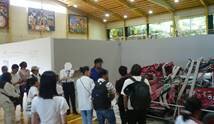 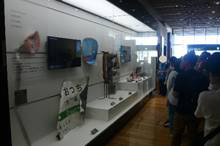 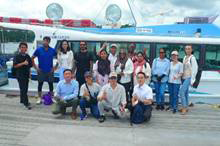 |
The participants visited disaster remains and museums in Miyagi and Iwate Prefectures to learn about the actual damage caused by the earthquake and tsunami of the Great East Japan Earthquake. The participants visited the Matsushima Coast and learned about the importance of tourism resources in the recovery process. Furthermore, they learned about the differences in disaster prevention efforts among various countries. |
| 2024/02/26 | Saitama & Tochigi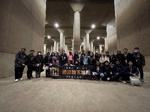 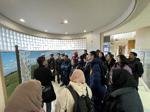 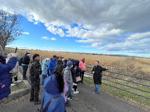 |
The participants visited the Metropolitan Area Outer Discharge Channel, which is designed to reduce flood disasters in the upstream areas from the Edo River to the Tone River. They collected information and exchanged views about its functions, effectiveness and costs about this world’s largest underground flood management facility. They also visited Watase Artificial Wetland, a Ramsar site, to gather information and exchange views about flood control, water supply, history of copper poisoning incident, wetland ecosystem and the role of annual controlled burning practices. |
| 2024/02/19-02/22 | Taiwan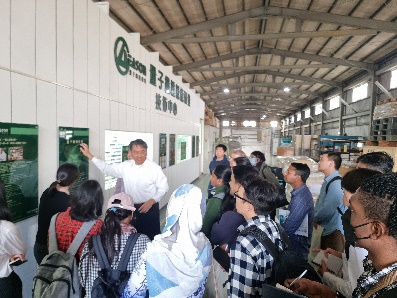 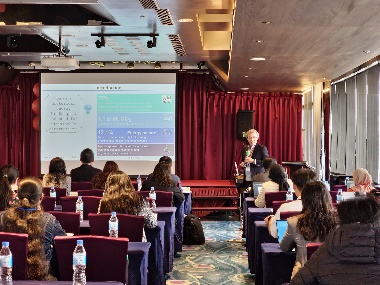 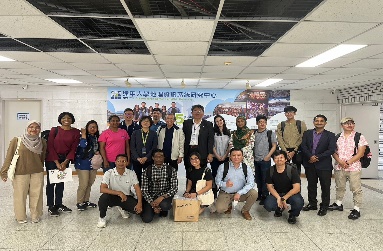 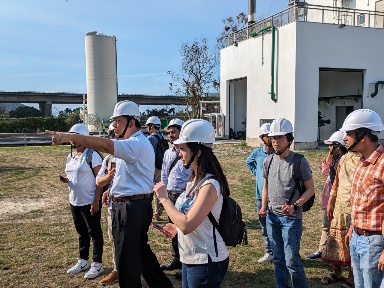 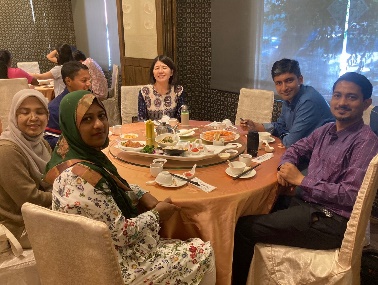 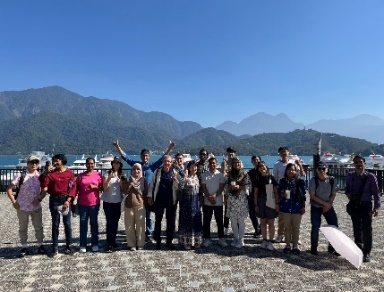 |
The filed study promoted international exchanges for r different disciplines, especially integrated solid waste management, material science, technology innovation for small island economy, and ways to meet sustainable development goals through the collaboration of industry, educational institutions, and local community members. Participants learned from different green technology institutes at Feng Chai University especially related to bioplastics and GIS. They also learned about international platform for biotechnology professionals to share technologies and research achievements through collaboration to develop relevant technologies in the bioenergy sector. |
| 2024/01/31 | Tokyo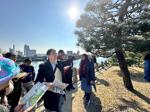 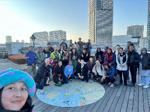 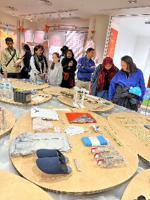 |
The participants visited areas in and around Tokyo to learn about flood and disaster preparedness and exchange views. In Tokyo, the participants gathered information about super levees along the Sumida River and the disaster prevention measures. Shioiri Park is located on the super levee that is designed for the evacuation site with emergency camp sites. They also visited Tokyo Rinkai Disaster Prevention Park in Tokyo Bay to experience disaster measures within 72 hours. Regarding private sector disaster management measure, they observed newly established Azabudai Hills. |
| 2023/12/02, 12/8 | TSUKUBA, Research Institute 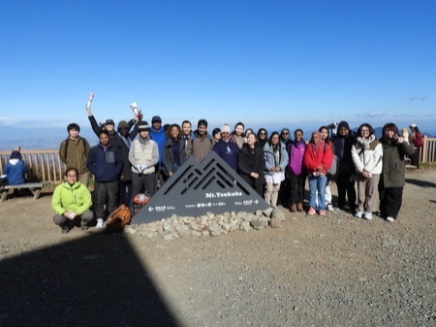 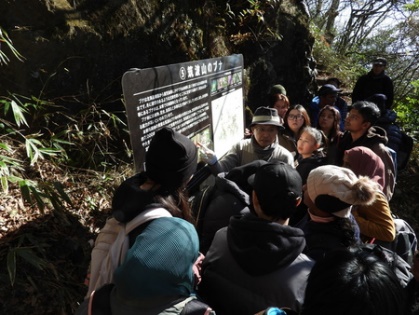 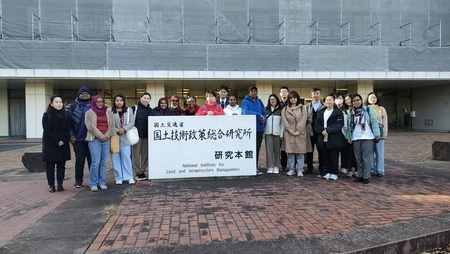 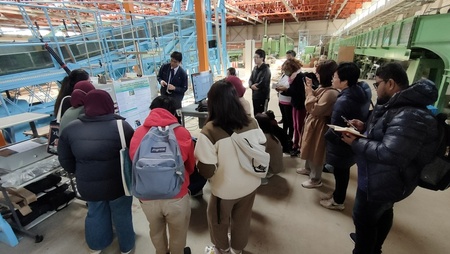 |
Tsukuba and received on-site explanations from Dr. Tanaka, an expert on the impact of climate change on beech forests in the area (2 Dec). At the National Institute for Land and Infrastructure Management (NILIM), the participants received training on sediment disasters and their countermeasures from Dr. Yamakoshi Director of the Erosion Control Research Office, and toured the experimental facilities. ibid. (8 Dec.). This enabled us to comprehensively enhance our knowledge on climate change issues from three perspectives: forecasting, natural effects (ecosystems) and social effects (disasters). |
| 2023/09/11-09/19 | Netherlands and Germany 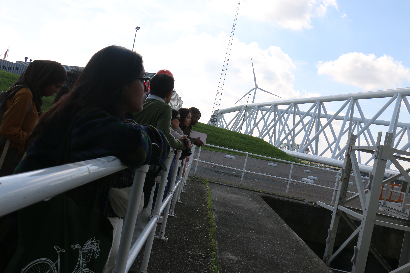 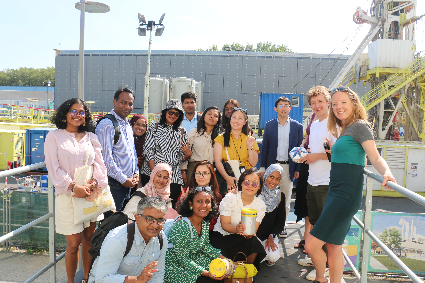 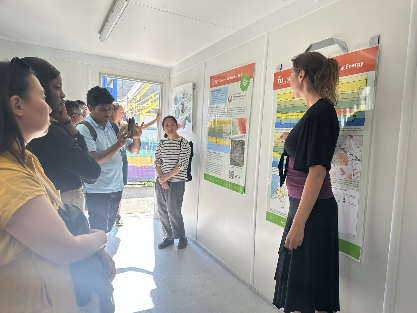 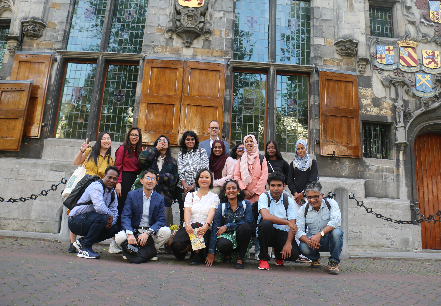 |
JDS students visited the cities of Amsterdam and The Hague to discuss the problems posed by climate change, flooding and other disasters to urban functions. They gathered information from discussions with city officials on how to restore canals while preserving their own traditional canal landscapes and on the latest methods of waste disposal in canals. They also visited disaster prevention facilities to protect economic facilities on major rivers from flooding and sea level rise and learnt more about unique technologies. At the same time, information was collected on how to deal with groundwater chlorination. In Delft, they were informed about a sustainable innovation project at the University of Technology called Green Village, which is created from community-industry partnerships, and the development of a geothermal power plant on campus. In addition, they attended a lecture and exchanged views with a representative at the office of the water board, the Netherlands' own water resources management organisation since the Middle Ages. In Rotterdam, information was collected on traditional Dutch water measures. They also visited a floating office and a community project on urban greening and collected information on urban planning while observing the redevelopment of water landscapes. In addition, they visited recycling case studies to hear local opinions. At the Rhine River Commission in Koblenz, researchers from the organisation provided detailed information on the transboundary management system for the entire Rhine River. In Düsseldorf, they visited one of the largest urban greening projects in Germany and saw how trees in huge buildings are managed. Overall, the JDS students gained information on Dutch and German cutting-edge attempts in water management and climate change and urban and rural development, and were able to compare them with examples from their own countries and seek solutions to their own problems. |
| 2023/09/13-09/15 | Osaki Town (Kagoshima) 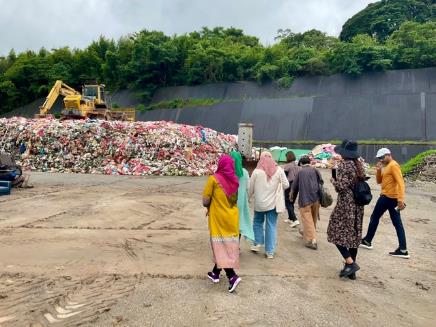 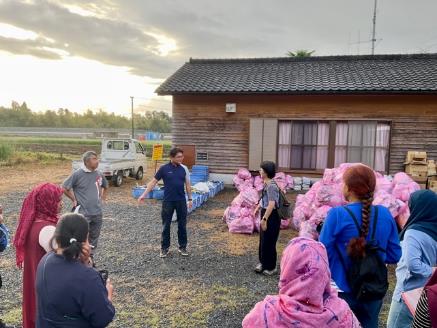 The length of the text is adjustable |
The participants visited Osaki Town, Kagoshima Prefecture, to learn about thorough resource recycling and circular society (i.e., the Osaki System), which Osaki has progressed through close collaboration among the municipal government, residents, and private companies under their original concept of Circular Village. During the field trip, they visited the final disposal site, organic and non-organic waste recycling facilities, local community waste collection, shochu (distilled spirit) factory, and eel farm. We also had special lectures by local experts from Osaki Town Office and Osaki SDGs Promotion Council. On the last day, the participants presented the characteristics of the Osaki System and the applicability of the system to their home countries. They discussed this with the local experts. |
| 2023/09/10-09/12 | Miyagi and Iwate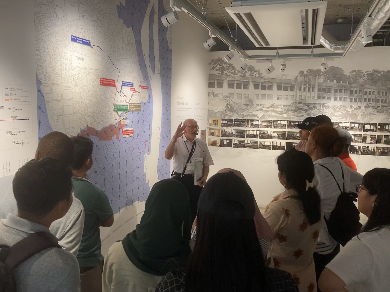 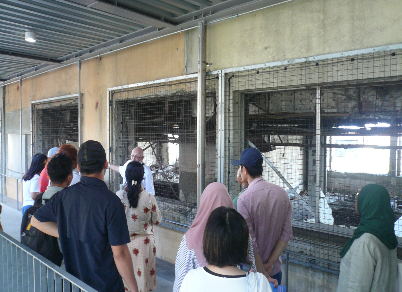 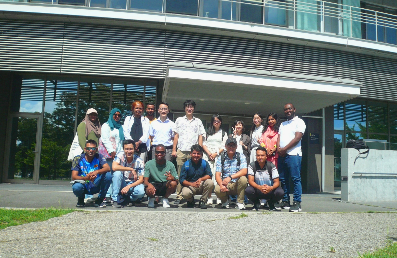 |
Participants visited ruins and museums related to the Great East Japan Earthquake in Miyagi and Iwate Prefectures, where they learned about the actual impact of earthquakes and tsunami disasters. They observed the distinctive geographical features of the Tohoku region's Pacific coastal area, which contribute to the expansion of tsunami damage in coastal areas. They also visited Tohoku University and attended a special lecture on the role of the ocean in disasters and abnormal weather. Participants engaged in discussions and exchanged opinions on disaster prevention challenges in various countries around the world. |
| 2023/02/11-02/18 | Kansai (Kyoto・Osaka・Kobe)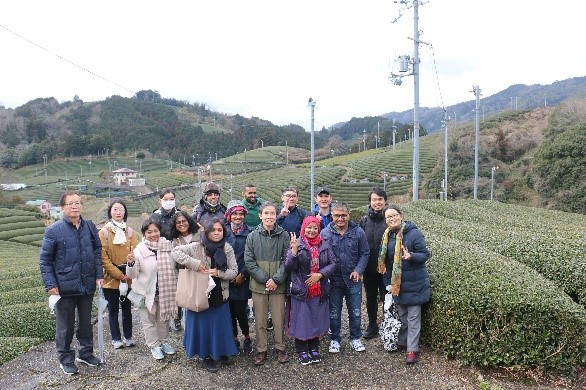 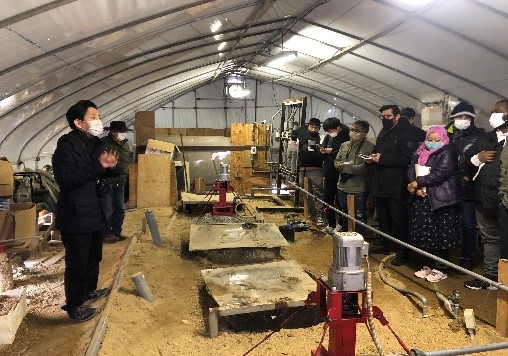 |
From February 11 to 18, 2023, the participants attended lectures by three researchers from Kyoto University and Kobe University, and learned academic and practical knowledge on water environment management, wastewater/waste treatment and resource recovery and biomass energy production, organic and smart agriculture through visits to Lake Biwa Museum, Yagi Bioecology Center, Wazuka Town, Kyoto University Graduate School of Agriculture Farm, Lake Biwa/Yodo River Water Quality Conservation Organization, Kobe City Higashinada Treatment Plant and Yuge Farm. Through visits to the Kyoto Graduate School of Agriculture farm, the Lake Biwa-Yodo Water Quality Conservation Organization, the Kobe Higashinada Treatment Plant, and the Yumigake Farm, participants acquired academic and practical knowledge about water environment management, wastewater/waste treatment/resource recovery and biomass energy production, organic farming and smart farming. Finally, through group work and presentations, students gained a deeper understanding of sustainable water environment management, agriculture, and environmental conservation. |
| 2023/01/31-02/03 | Amamiohsima (Kagoshima) 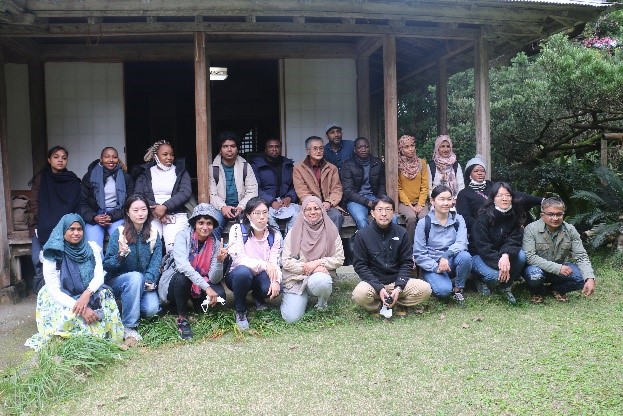 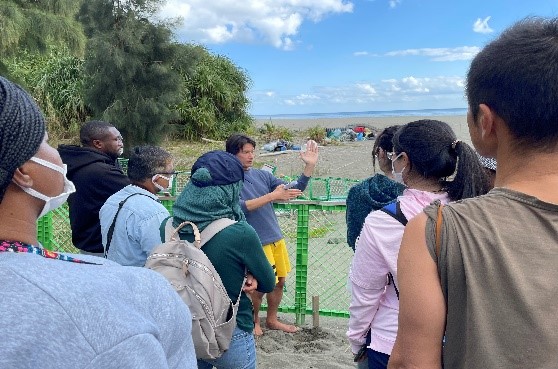 |
The JDS students visited Amami Oshima Island, which will be registered as a World Heritage site in 2021, to gather information and exchange views on the conflict between biodiversity conservation and regional development, the ideal form of ecotourism, future utilization of World Heritage natural resources, and disaster prevention measures in the region. The JDS students first learned about endangered and invasive species on Amami Oshima from local experts. Based on this, they participated in ecotourism through a certification program for guides. At the same time, they learned how to sustain the nature conservation required by the World Heritage registration from the construction administration-oriented economy that has continued for many years since the end of World War II. Furthermore, they gained the ability to analyze how disaster prevention measures due to global warming and typhoons are related to the sustainability of the local economy and environment. |
| 2023/01/25 | Kasaikaihin park・Tokyominatorie・Asakusa・Shioiri park (Tokyo) 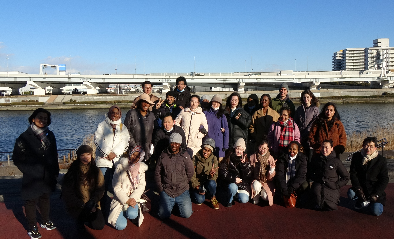 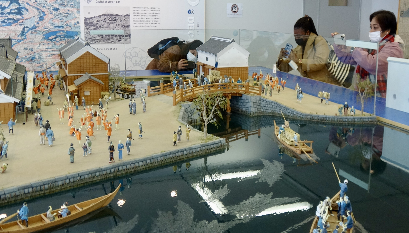 |
In this activity, the group visited a Ramsar site in Tokyo to observe species conservation and public access. They also visited a museum to obtain an overall picture of the history of Tokyo's bayfront development and disaster prevention. Furthermore, to learn about the Tokyo Metropolitan Government's disaster prevention activities in the Sumida River basin, they visited super levees, bridges, and disaster prevention equipment to gather information and exchange views on countermeasures against urban disasters. This enabled the JDS students to examine the future of disaster prevention measures in their own countries by comparing them with examples from their own countries. |
| 2022/12/07-12/09 | Kitakyusyu (Hukuoka) 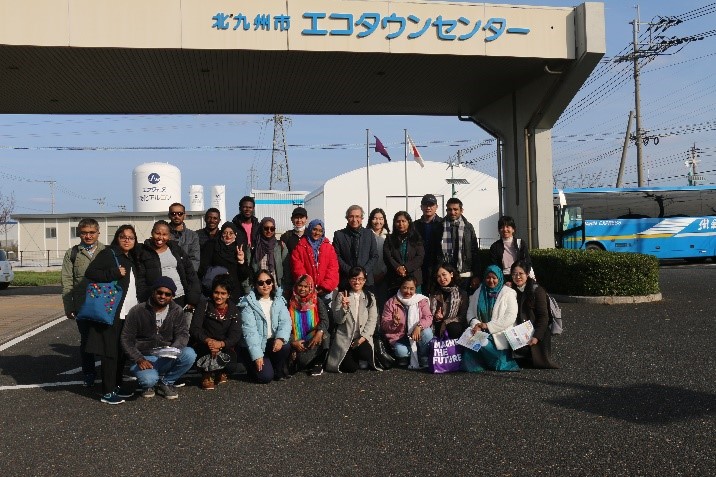 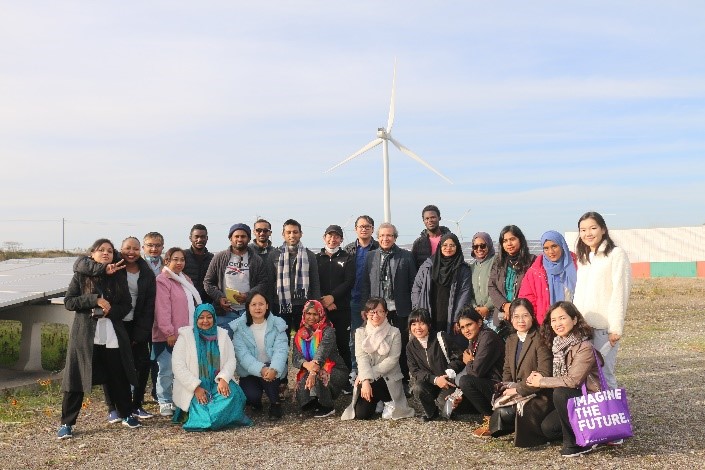 |
During this field study, we visited Kitakyushu Eco-Town and learned about the importance of cooperation between industry, government, and the city. Here, the students learned about recycling technologies for plastic bottles and e-waste. They also learned about wind and solar power generation systems in the Eco-Town complex. They also visited Yamaguchi Dairy's biogas plant, which produces biogas from by-products and waste from the dairy industry and uses it as an energy source for the industry. Finally, the students visited an incineration and resource recovery facility in Shimonoseki City. The students were able to understand the importance of having a life cycle thinking about resource management. |
| 2022/12/06 | Metropolitan Area Outer Discharge Channel (Saitama) and Watarase Wetland (Tochigi)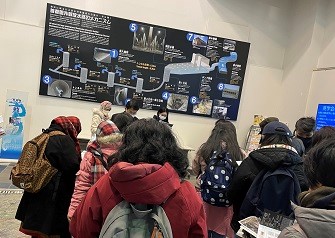 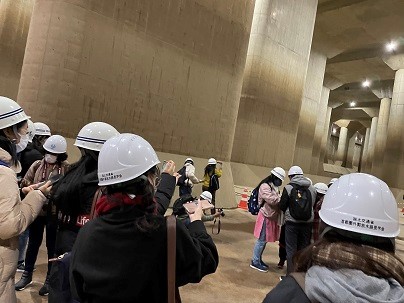 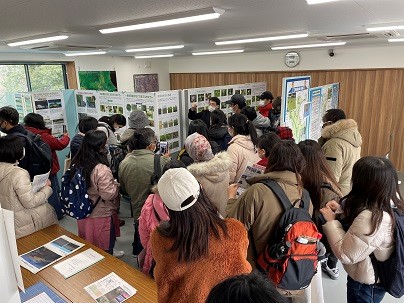 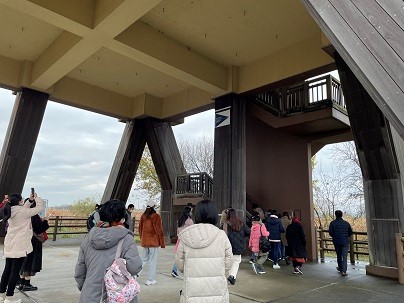 |
The participants visited the Metropolitan Area Outer Discharge Channel in Saitama Prefecture and Watarase Wetland in border areas of Tochigi, Ibaraki, Gunma, and Saitama prefectures. This training focused on flood control and wetland management in the Kanto region. At the Outer Discharge Channel, the JDS students visited the world's largest underground flood control facility, which is designed to reduce rising water levels in four surrounding rivers. Guided tour gave them detailed information about this facility and its functions. This allowed the JDS students to gather information and exchange opinions on the possibility of organized infrastructure development. At Watarase Wetland, the students learned about the reservoir's role in controlling flooding of the Watarase River, which flows around Furukawa City, to improve water quality, provide water for agriculture and domestic use, and conserve wetlands and birds under the Ramsar Convention. They also gathered information on the damage caused by the 2019 typhoon. In addition, the site's former Yanaka Village was the site of eviction during the Ashio Mine Poisoning Incident at the beginning of the 20th century, allowing the group to gather information and exchange views on the pollution movement in Japan. |
| 2022/11/22 | Yokota farm (Ibaraki)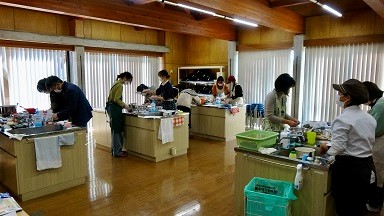 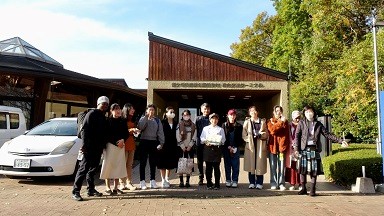 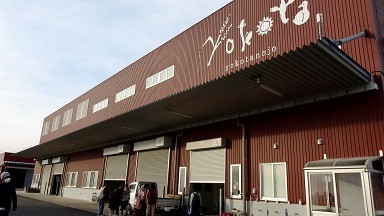 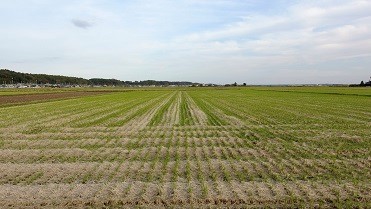 |
The training on food and agriculture was conducted at Yokota Farm. This smallholder business has cultivated rice in Ibaraki Prefecture for several hundred years. After being incorporated as business entity about ten years ago, Yokota Farm has received Emperor's Award and the Minister of Agriculture, Forestry, and Fisheries Award for its good example in small-scale farming businesses. JDS Fellows visited the farm and collected information from Mr Yokota and his wife on farm management, value chain, food education, measures for abandoned land, and agricultural tourism. They were also able to gather information and exchange opinions on methods of preserving and sorting harvested rice, mechanization, and cost reduction. |
| 2022/09/14-09/16 | Osaki Town (Kagoshima)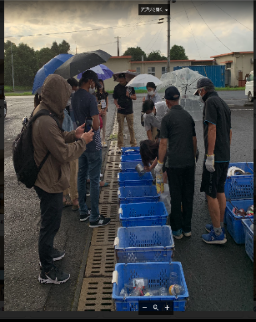 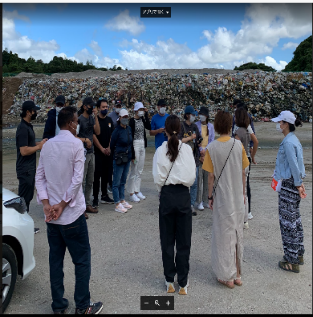 |
The participants visited Osaki Town in Kagoshima Prefecture to learn about the formation of a recycle-oriented society. It developed a “Osaki System,” in which general waste materials are thoroughly separated, sorted and recycled. The tour included lectures and discussions by Osaki Town environmental officials (including a JICA-supported project for horizontal deployment in Indonesia) and tours of various facilities (final disposal landfill, recycling facility, general waste incineration facility, and resource waste base collection). The participants also learned about town’s policies to promote youth immigration as part of regional revitalization and regional exchange through recycling. On the final day, the participants made presentations on the challenges and strengths of promoting resource recycling in their home countries under the theme of the applicability of the Osaki system to their home countries, and received advice from Osaki Town officials. |
| 2022/09/06-09/08 | Ryukyu University (Okinawa)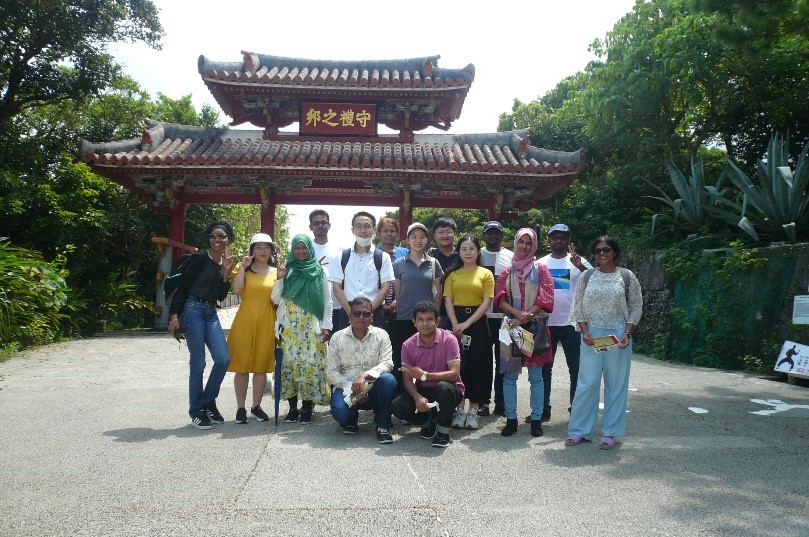 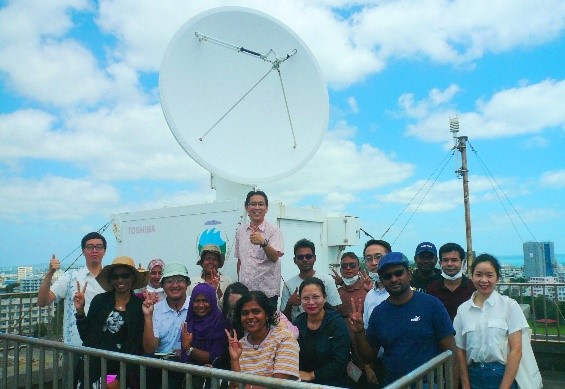 |
The Participants listened to lectures on tropical storms and meteorology by two researchers from Ryukyu University. They visited the Fujukan Museum on the Ryukyu University campus and learned about the relationship between natural disasters and ecosystems. They acquired information about the industry and tourism in the Okinawa Islands through a tour of Shurijo Castle. Based on what they learned, they engaged in group work and deepened their understanding of sustainable development and environmental conservation through presentations and discussions. |
| 2022/08/28-08/31 | Kushiro (Hokkaido)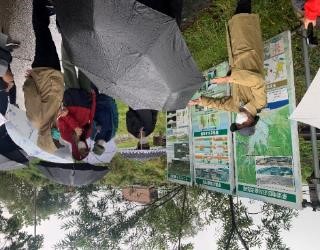 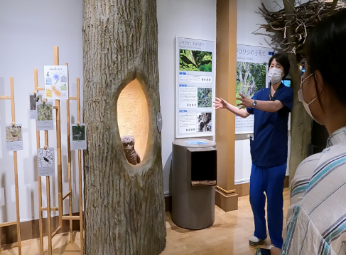 |
The participants visited the Kushiro Wetland area in Hokkaido to deepen their understanding about marshland ecosystem services, conservation of red-crowned cranes (a national protected species) and rare plants and animals, ecosystem conservation measures through the Old River Restoration Project, and eco-tourism promotion by visiting facilities (Akan International Crane Center, Wildlife Conservation Center, and Kushiro Construction Department of MLIT) and relevant areas. On the last day, the participants presented about the conservation of the Kushiro Marsh ecosystem and lessons learned for environmental conservation, disaster prevention, and industrial promotion in comparison to their home countries. They received advice on their presentations from experts. |
| September/2019 | The Netherlands/Germany |
This field trip aimed to enhance JDS Fellows’ knowledge and insights about agricultural practices, disaster management, and water governance in the Netherlands and Germany. In Amsterdam, the Fellows observed water canals that are important part of city planning and economic development. In Haarlem, the Curuquius museum showed the historic water drainage practices. In Delft, the Fellows observed water drainage practices and dairy farms in polders. They also had seminars with graduate students at the Delft University of Technology. The Fellows then visited the unique storm surge barrier called Maeslantkering at the mouth of the Rhine River (picture) to understand the Delta Work of the Netherlands and the importance of flood protection for the economy. The Fellows then visited Rotterdam to observe the environmental restoration of former development sites and floating forests. They presented about their research topics at the Rotterdam University of Science and Technology and interacted with undergraduate students there. In Germany, the Fellows had a seminar and a short tour about flood management and water governance at the Rhine and the Rhine Commission in Koblenz. Then they went downstream to Cologne for more flood protection practices. |
| August/2019 | Kushiro(Hokkaido) |
Participants visited the Kushiro Wetland National Park area, Hokkaido, the first and largest Ramsar site in Japan, to learn sustainable management of the wetland through wise use of natural resources and ecosystem services in tourism, fisheries and so on. Guided by Mr. Hisashi Shinsho, Chair of Kushiro International Wetland Centre Technical Committee, the participants experienced an adventurous wetland walk, trail walk and river canoeing to learn the unique ecosystems including groundwater flow and the meandering river restoration project in Kushiro Wetland. They also learned about local efforts to wise-use natural resources through discussion with Mr. Takeshi Tosa who is a local fisherman, ecotourism operator and devoted conservation practitioner, conservation research and practice of red crown cranes at Akan International Crane Center and rehabilitation and conservation activities for the local endangered raptor species at Institute for Raptor Biomedicine Japan. |
| August/2019 | Okinawa |
Students visited University of the Ryukyus and attended lectures on tropical cyclone observations, forecast, and disaster prevention. Students also had a short campus tour including a meteorological radar system and university museum. On the following day, the students visited Shurijo Castle Park to learn historical background on the Ryukyus with cultural communications with China and surrounding countries. |
| January/2019 | Kushiro(Hokkaido) |
With sustainable management of Kushiro Wetland as a core topic, students learned about conservation and utilization of natural resources for economy and tourism, river restoration, and endangered wildlife conservation in the Kushiro Wetland area through site visits, lectures and discussion by local experts. |
| December/2018 | Kita-Kyushu/Yamaguchi |
Students visited Eco Town Center in Kita-Kyushu City and received an overview of the Eco Town project including all the recycling initiatives. The main goal of Eco-towns in Japan is to design a recycling-oriented society where wastes in one sector can be used as raw materials in other industrial sectors. After the Eco Town visit, the students visited a biomass facility in Arao city. On the following day, the students visited facilities to make effective use of biogas and methane gas and received explanation about the relationship between region and industry in waste recycling. |
| November/2018 | Malaysia |
Students participated in the 10th Better Air Quality Conference 2018 (International Conference on Air Quality Improvement) in Kuching, Malaysia. Students learned about the current state of atmospheric environmental problems in developing countries, mainly in the Asian region, and the concepts and efforts concerning air quality management technology and policies. In addition to gaining knowledge listening to lectures and presentations by experts, the students nurtured their problem recognition ability and international communication ability through communicating with the participants at the conference sessions. |
| September/2018 | Okinawa |
This field trip is designed to examine the challenges and possibilities of developments in Okinawa. This area has been one of the most popular tourism destinations in Japan with rich cultural, environmental, and historical heritages. FOCUS: (1) the conservation of local ecology and marine ecology; (2) a historical study about the establishment of Ryukyu culture and impact of World War II on the local environment and economy; (3) historical roots of Japanese-Okinawan relations; and (4) possibilities of future tourism in remote areas |
| July/2018 | Liverpool(UK) |
Visit Liverpool, UK, learn about Mercy River campaign, the pioneering environmental symbiosis city policy in the world. Students learned about water management policy and urban development centering on rivers and considered policy application to their country while comparing their case. |
| May/2018 | China | This international internship to China consisted of three parts. (1) Beijing internship: Field trip to Xiaojiahe Wastewater Treatment Plant (Beijing) and the China-Japan Joint Seminar on Water Environment Technology in Tsinghua University. (2) Tianjin internship: Field trip to the Sino-Singapore Tianjin Eco-city and the Symposium on Technological Innovations in Environmental Control and Resources Recovery & Utilization in Nankai University, Tianjin. The two field trips are related with environmental issues and applicable technologies in China, through which the students can know how people are trying their best to make their surroundings more beautiful and sustainable. During the seminars, the students had good chance to communicate with the young generation of scientists and specialists who are contributing themselves to environmental protection and sustainable development in China. (3) 2018 International Students Conference on Environment and Sustainability (ISCES) hosted by the UNEP and Tongji University. The students were offered great opportunities to exchange ideas on the environment and sustainability regarding plastic wastes with fellow students from more than 30 countries. The students also actively participated in the intensive lectures, group discussions, field trips to rural and urban areas, and poster competitions. |
| February/2018 | Kushiro (Hokkaido) |
On the theme of sustainable natural resource utilization, students learned about natural revitalization, tourism use of Kushiro Wetland, rare wildlife conservation in Kushiro Marsh, historical cultural background of nature management, and hotel management using waste heat and agriculture among other topics. |
| February/2018 | Mito (Ibaraki) |
A tour of Lake Senba in Mito city. Mito city is focusing on the conservation of the historical landscape and is also working on the lake environment of Lake Senba, which was originally used as agricultural water. In addition students had explanation about the city's efforts and water purification facilities that do not impair the historical landscape. |
| February/2018 | Okinawa |
JDS students learned the influence of overuse and climate change on coral reefs, the cultural formation of urban landscape in Okinawa, and the relationship about agriculture and regional promotion. With the cooperation of the University of the Ryukyus, we had the opportunity to attend lectures of researchers at the university and learned the latest research results. |
| February/2018 | Tsukuba (Ibaraki) | Students visited the Center for Genetic Resources, Gene Databank and Agricultural Environment Change Research Center in the Agricultural Research Organization, and learned the latest knowledge on genetic resource recording, preservation technology and soil carbon storage research through lectures and facilities tours. |
| January/2018 | Tokyo | This year JDS students together with 6 professors joined this domestic trip which mainly consisted two activities: (1)visiting to the National Museum of Emerging Science and Innovation; and (2)surverying the Tokyo bay, especially Odaiba, Hinode, and Asakusa areas. All the participants experienced the advancement of technologies for environmental managemnet in Japan, especially on surface water systems and waste disposal, which is beneficial for the students to obtain the real ideas of betterment of the environment. |
| December/2017 | Kita-Kyushu/Yamaguchi | This trip gave students to learn about the importance of industry-government-city collaboration regarding environmental management. In the visit to Kitakyushu Eco Town we learned about the technologies to recycle PET bottles and Al and Steel cans. We also visited Yumoto biomass boiler that supplies hot water to a hotel by using only wood chips as fuel. We had the opportunity to visit Yamaguchi Dairy industry biogas plant. This plant uses the byproducts and wastes from the dairy industry combined with sludge form the local wastewater treatment plant and produces biogas that is used as a source of energy in the dairy industry. Finally we visited a food waste recycling plant u\in Ube city. The plant uses the food wastes from super markets, convenience stores, hotels, etc to produce animal feed. From these field studies students understood the importance of having a life cycle thinking regarding resource management. |
| July/2017 | Liverpool(UK) | Mercy River campaign is a pioneering environmental symbiosis in the world. Under the guidance of Professor Peter Batey of Liverpool University, who was the chairperson of this campaign, JDS students were able to gain knowledge about the urban development centering on rivers, water pollution policy and participation process of citizens. |
| March/2017 | Ibaraki | JDS Fellows and SUSTEP students visited Shimizu Farm and learn about small/medium sized farm management, soil production, and larger agricultural concepts from Mr Shimizu. |
| January/2017 | Okinawa | JDS Fellows and SUSTEP students learned about desalination technologies, wetland conservation, coastal development and historical conflicts. |
| January/2017 | Tokyo | JDS Fellows and SUSTEP students visited the water supply museum in Tokyo. They also observed super levee development areas along the Sumida River to better understand Tokyo's water management policies and disaster management. |
| January/2017 | Kushiro (Hokkaido) |
The purpose of the trip was to learn about the lifestyle, industrial activities, biodiversity protection, waste management, and eco-tourism initiatives in Hokkaido, one of coldest area in Japan. In Betsukai town, the study focused on business entities working with dairy farming and biomass utilization. In Kushiro city, our fellows visited Lake Touro, Kushiro wetland and some other sites related to eco-tourism. Through this trip, the students learned about the interlinkages between socio-economic activities and the environment in a cold area. |
| December/2016 | Tokyo |
JDS Fellows and SUSTEP students visited the solid waste treatment system in Tokyo at the Central Breakwater Intermediate and Final disposal facilities and sites. They learned about recycling technologies and future waste management problems in Tokyo. |
| October/2016 | Koga (Ibaraki) | JDS Fellows visited "First Eco Park" and "Dream Factory" of the Sekisui House Corporation in Koga City. This visit was to understand the effort of private companies to build ecologically friendly houses. Fellows learned about newest technologies for "Zero Emission Houses" with the combined use of the newest solar panel system and gas-energy production. They also observed the technologies for disaster adaptation such as the automatic emergency energy supply and rain water collection. The Sekisui House Corporation also has a recycling factory here to collect 100% of its building wastes to be recycled. Through this visit, the Fellows could develop the idea about up-dated technologies for house building that can be useful in developing countries. |
| September/2016 | Sugadaira (Nagano) |
JDS Fellows in the first year and the second year joined this three-day trip to the Sugadaira area in Nagano Prefecture to mainly study about "Satoyama" practices. On the first day, they observed agricultural area of Obuse, where chestnuts and canola oils have been produced. They also observed old Japanese houses here. At night, they received a short lecture on vegetation in the Sugadaira area. On the second day, the Fellows conducted vegetation survey in the Sugadaira area through trekking and discussed about the maintenance of the alpine ecosystem, including the function of high-altitude wetlands. On the third day, the Fellows received lecture and conducted fieldwork about the impact of the increasing deer population on the mountain ecosystem. They also observed tourism and resort expansion in Karuizawa. |
| August- September/2016 |
The Netherlands |
The Fellows participated in the joint seminar between the University of Tsukuba and the Delft University of Technology in the Netherlands. On the first day, the Fellows spent a few hours to discover the roles of the intricate canal system in Amsterdam historically. On the second day, they moved to the town of Delft and had a tour from a Delft University of Technology professor about how waterways played important roles in the development of this city. On the following day, the Fellows participated in in-class seminar and listened to lectures by Delft University of Technology professors and doctoral students about disaster prevention, green development of cities, and water management. In the afternoon, the Fellows made presentations about environmental issues in their countries and exchanged ideas with researchers at Delft. On the fourth day, a representative in urban planning from the Rotterdam government came to present Rotterdam's urban planning and disaster prevention efforts. In the afternoon, the Fellows were guided by this person to the Rotterdam area and observed on-going redevelopment plans in the city. On the fifth day, the Fellows visited and had a lecture at Maeslantkeringweb, the large storm surge barrier. They collected information about the Netherlands Delft Work and technologies to save ports from storms and floods. Afterward, the Fellows visited one of the largest intensive agricultural complexes in Europe called "Westland." Here the Fellows learned about green house agriculture and traditional water routes to transport agricultural goods. The Fellows overall learned about disaster management, water management, urban/regional planning, and agricultural efficiency. They chose one topic and wrote a report by comparing issues in their own countries. |
| June/2016 | Ashio (Tochigi) | JDS Fellows visited the Ashio valley, the former copper mining site. Here they learned about the impact of copper mining on the valley environment, especially at the former neighborhood of Matsuki. They also observed some remnants of advanced industrial developments in the town, including the Japan's first hydroelectric dam site, iron bridges, and mine technologies. From a guide who grew up in Ashio, the Fellows learned about social life of Ashio in the mid-twentieth century. Another important aspect of this trip was to observe the forest restoration efforts in the Valley by volunteers. The Fellows could learn how once devastated valley became covered with green areas and brought back some wildlife such as bears, deer, and monkeys. The Fellows wrote their reports on the history of Ashio in comparison with issues in their own countries. |
| May- June/2016 |
Shanghai (China) |
The major SUSTEP consortium universities including IPB (Indonesia), NTNU (Taiwan), Fudan University (China), Tongji University (China) and CUG (Beijing, China) participated in the International Symposium on Education and Environmental Sustainability held in Wuxi, Jiangsu Province, China during May 31 to June 1. Together with the professors, the JDS fellows had a good communication with the students from these universities concerning environmental education, development of sustainable technologies and policies. All the follows visited the Taihu Lake which is suffering from algae and water environment deterioration problems, where they also witnessed the changes after effective and sustainable technologies being applied. On June 2 the fellows had a field trip to a dairy farm where a large-scale biogas plant has been constructed and operated to deal with the dairy manure and wastewater, and recover energy as biogas (methane) as well through an environmentally-friendly way. During June 3 to June 8, the fellows took part in the 2016 International Student Conference on Environment and Sustainability (ISCES). They surveyed the Chongming Eco-island and several typical places in the center area of Shanghai, and experienced the vast changes after urbanization by themselves. Besides, intensive seminars and competitions among the international participants were conducted regarding Sustainable Community Space and Green Lifestyle. |
| April/2016 | Ibaraki |
JDS Fellows visited Shimizu Farm, one of leading organic farms in Japan, to learn about soil production, breeding, small-scale farm management, and the marketing of farm products. Mr Kiyoshi Shimizu, the owner of the Farm and the executive director of nation-wide agricultural organization called the BM Technology Association, showed how he came up with ideas of making Carbon rich soil and weed control technologies as well as his BM formula (treated and enriched wastewater), as organic fertilizer. The Fellows also met various business partners in Ibaraki Prefecture. Mr Shimizu and these partners have engaged in the lake ecosystem restoration project with their own funding. This project is based on a premise that farming and ecosystem restoration should be interdependent activities; and farmers must have more comprehensive visions in taking advantage of regional ecological characteristics for farming. |
| January/2016 | Okinawa |
JDS fellows joined the field trip to the main Okinawa Island and engaged in hands-on sugarcane harvesting activity and brown sugar making. They also learned about the Karst environment and marine ecosystems in connection to distinctive Okinawan culture and history. On the final day, they visited the Ramsar site and observed the expansive wetlands in urban areas. An expert on Okinawan traditional language and culture, Shisei Toma, was invited to give lecture about history and culture of Ryukyu people. The Fellows also visited some politically controversial environmental problems in Okinawa such as the Futenma Replacement Facility plan at Henoko Bay. |
| January/2016 | Tokyo |
In the morning, in collaboration with Tokyo’s Bureau of Environment, JDS Fellows visited one of the most high-tech incineration plants in the Odaiba area and learned about waste management and recycling. They also obtained information about underground garbage collection pipes in the area. In the afternoon, they visited community-based culture/history education facility at Fukagawa. The museum has real-size houses and building arrangement of the Edo period. This visit helped the Fellows to better understand the past flood and disaster management ideas in the Sumida watershed. Those Fellows who visited the super levy in December 2015 could understand the historical changes in river flood management in Tokyo. |
| December/2015 | Tokyo |
In the morning, in collaboration with Tokyo’s Bureau of Environment, JDS Fellows received lecture about waste management of the Tokyo Metropolitan Government. They received information about garbage collection, processing, and final disposal processes. The Fellows then visited garbage processing facilities and final disposal site called the Central Breakwater Outer Landfill Site. They learned about the future plans of waste disposal and various ways to maintain solid waste safe from environmental contamination. In the afternoon, the Fellows took a water taxi and observed Tokyo’s “super levy” project and other river management areas in the Sumida River. |
| October/2015 | Tokyo |
JDS Fellows had small seminars about eco-town projects in Tokyo at the Metropolitan government building. They acquired knowledge about waste management and urban planning for eco-cities. The Fellows also visited the office of the Japan International Cooperation Center and exchange ideas about the future outlook of JDS alumni associations. |
| September/2015 | Izu/Shimoda (Shizuoka) |
This trip attempted to better understand rural development (e.g., community-based tourism) and the marine environment. The Fellows visited the University of Tsukuba's Marine Research Center and observed some of its on-going research projects. They had a small seminar about geoparks. Dogashima cruising allowed them to observe the formation of unique geological features. In Toi, the Fellows learned about the mining operation and tourism development at the former mining site. They also received a lecture about the early contact history in Shimoda between Japanese and Americans at Ryosenji Temple. |
| July/2015 | Hanoi (Vietnam) |
This seminar was conducted in collaboration with the Hanoi University of Natural Resources and Environment (HUNRE) and the Delft University of Technology. The aim was to analyze water problems and find some possible solutions. JDS Fellows acquired knowledge about urgent water problems in Hanoi in two-day seminar. They also spent one day in the field, observing and collecting data about water problems. |
| June/2015 | Ashio (Tochigi) |
JDS Fellows visited the former Ashio copper mine site. Former residents and guides showed them to important industrial achievement during the thriving period of mining operations. The Fellows also observed reforestation activities in the Ashio valley. At the Ashio History Museum, they acquired knowledge about the history of mining technology and the emerging environmental activism. |
| June/2015 | Shanghai (China) |
This international internship was carefully designed with the combination of an international student conference (2015 International Student Conference on Environment and Sustainability) with two additional days' field trip particularly focused on applicable technologies and management systems of waste and wastewater treatment in China. This activity was co-organized by Tongji University (China).The Fellows learned how to use different treatment technologies to cope with different organic solid wastes and wastewaters, making full advantages of these wastes to benefit local people. |
| March/2015 | Kasumigaura (Ibaraki) |
This trip introduced JDS Fellows to some major economic activities in the water environment around Kasumigaura Lake, Japan's second largest lake. They observed lotus root harvesting and other wetland crop cultivations. They visited the former water town, in which elaborate canal systems developed, and only boats were used for transportation. Then they observed the recent road and bridge works around the lake. |
| February/2015 | Watarase Yusuichi (Chiba) |
As the only Japan's artificial wetland to be protected under the Ramsar Convention, Watarase wetlands functions as flood control, water purification, and water supply reservoir. The area also includes the Yanaka village site, which was forcibly closed due to copper pollution from the Ashio mine in the beginning of the twentieth century. The Fellows learned about both history and current scientific practices here. |
| January/2015 | Meiji Gakuin University |
With renowned environmental/disaster law expert from the University of California, Berkeley, JDS Fellows went to Meiji Gakuin University for a seminar. At this seminar they learned about disaster law that pertained to large-scale pollution. The Fellows also exchanged ideas with faculty members at Meiji Gakuin to expand their academic capacity. |
| September/2014 | Nagano |
This fieldwork was conducted in the primary forest region of Buna trees in northern Nagano prefecture primarily to understand forest ecology and rural/regional development. Students interacted with local foresters and farmers to understand economic and social issues they face today. Students also participated in one of distinctive local autumn festivals in Iiyama City and learned about Japanese religious culture. They lodged in one of temples, which serves as various social functions, including forest therapy for cancer patients. |
2. Theses
2022
- Jayasekara Sachintha “Tropical Cyclones and Low-pressure Systems in the North Indian Ocean and Extreme Weather Events over Sri Lanka “ (北インド洋における熱帯低気圧および低気圧とスリランカの極端気象現象)
- Jayasuriya J M Randeera Damith “Assessing Construction Workers’ Challenges in Managing Construction and Demolition Waste in Sri Lanka “ (スリランカの建築・解体廃棄物管理における建築従事者の課題についての考察)
- Liyanage Manjula Pradeep Gunathilake “Sustainable Management of Rehabilitated Sivalakulama Tank Cascade System in Galenbidunuwewa Divisional Secretariat, Sri Lanka “ (スリランカのガレンビンダンウエワ管区における修復されたシバラクラマタンクカスケードシステム の持続可能な管理)
- Silva Kulappuwa Wadu Kimesha Irangika “An Analysis of Coconut Production and Price Forecasting in Addressing Farmers’ Climate Change Adaptation in Sri Lanka “ (スリランカの農家が気候変動に適応する際のココヤシ生産と価格予測に関する分析)
2021
- AMARATUNGA A M DONA PESHALA RANJANI “An Impact Analysis of Environmental Policies on Reforestation and Urban Green Canopy Development in Sri Lanka“ (スリランカにおける環境政策が与える森林再生と都市のグリーンキャノピー拡大への影響の分析)
- Perera Abeywickramage Don Harshani Jeewanthi “Investigating the Mechanical Effects of Plant Roots on Slope Stability Using Global Root Strength Data“ (世界各地の根系の強度データを用いた植物根系の強度が斜面安定に及ぼす影響に関する検討)
- RANASINGHE R A DON RASANJA ASELA “Impact of Organic Soil Amendments on Plant Nutrients and Metal Ions Leaching“ (植物栄養素と金属イオン浸出に対する有機土壌改良剤の影響)
2020
- RAMMUNI DILINI VASUNDARA KUMARI SILVA “Hydrothermal Treatment of Sewage Sludge to Produce Biosolid Fuel“ (下水汚泥から水熱処理によるバイオマス固形燃料の生産)
- SENEVIRATNE HEWAPATHIRANAGE THUSHANI JAYAMINI “Economic Valuation of Eliminating Solid Waste Dumping into Pinga Oya Stream, Sri Lanka“ (スリランカPinga Oya細流における廃棄物投棄防止策の経済評価)
2019
- Ariyawansha Siripatul Devayalage Nuwan “Identification of Spatial and Temporal Variations of Roofing Materials to Reduce Asbestos Usage in Sri Lanka Using Hotspot Analysis.”
- Gajasinghe Arachchige Ganga Kavindi “Development of Activated Hydrochar from Paddy Straw for Nutrients Adsorption and Crop Water Management”
- Hemakumara R. M. N. C. “Impacts of Sand Mining Industry on Interprovincial State Land Management in Mahaweli Riverbank, Mahiyangana, Sri Lanka”
2018
- HEWAWASAM VINDYA “An Analysis of Climate Change Secretariat Initiatives to Achieve the National Climate Change Policy in Sri Lanka”
- MIHIRI KOKILA WIJESINGHE “Realizing the National Disaster Management Policy of Sri Lanka through Public Private Partnerships (PPPs)”
- MUNASINGHE NIMALI LAKMINI “The Assessment of Disaster Safety at Matara District General Hospital in Sri Lanka”
2017
- Dinesharachchige Anura Kumara Amaradewa “Sector-specific Estimation of Greenhouse Gas Emission using Environmentally Extended Input-Output Analysis for Sri Lanka”
- Batugoda Gedara Siri Karunaratne “Analysis of the Benefits of Integrated Municipal Solid Waste Management for Land Use Planning: A Case Study of Kandy Municipal Council, Sri Lanka”
2016
- Weerasuriya Moreen Bimali “Impact of Grazing Severity on Soil Properties in Upcountry Intermediate Zone of Sri Lanka”
- Kandiah Renugapathy “Water Budget and Usage in High Drought-Borne Area in Jaffna District, Sri Lanka”








